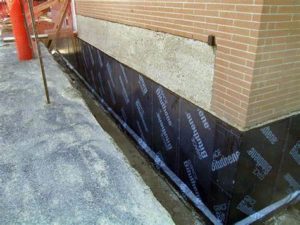Exterior waterproofing is a crucial aspect of protecting homes in Toronto from water damage. With its diverse climate, characterized by cold winters and heavy precipitation, Toronto poses unique challenges for homeowners seeking effective waterproofing solutions. Understanding the climate considerations involved in exterior waterproofing is essential to ensure long-term protection against water infiltration and potential structural damage. In this article, we will explore the climate factors to consider when implementing exterior waterproofing in Toronto.
- Freezing and Thawing Cycles: Toronto experiences significant temperature variations throughout the year, with freezing winters and milder summers. These temperature fluctuations can have a significant impact on the durability of exterior waterproofing systems. During winter, water trapped within foundation walls or exterior surfaces can freeze and expand, leading to cracks and weakened barriers. It is crucial to choose waterproofing materials that can withstand freezing and thawing cycles without compromising their effectiveness.
- Heavy Rainfall and Snowfall: Toronto is known for its heavy rainfall and occasional snowstorms. These weather events can result in excessive water accumulation around homes, increasing the risk of water seepage into basements and foundations. Exterior waterproofing systems should be designed to handle large volumes of water effectively. This may include the installation of proper drainage systems, such as French drains or weeping tiles, to divert water away from the foundation and prevent waterlogging.
- Saturated Soil Conditions: Prolonged periods of precipitation can saturate the soil surrounding a home’s foundation. Saturated soil exerts hydrostatic pressure against basement walls, making them vulnerable to water infiltration. When implementing exterior waterproofing measures in Toronto, it is essential to consider the soil composition and drainage characteristics of the property. Improving the soil’s ability to drain excess water away from the foundation can significantly enhance the effectiveness of exterior waterproofing systems.
- Humidity and Condensation: Apart from external factors, indoor humidity levels also contribute to moisture-related issues in basements. High humidity levels can lead to condensation on basement walls and floors, promoting mold growth and compromising the integrity of waterproofing systems. Homeowners in Toronto should ensure proper ventilation and moisture control within their homes to prevent excess humidity and condensation issues, which can undermine exterior waterproofing efforts.
- UV Exposure: While not directly related to precipitation, Toronto’s summers are characterized by prolonged sunlight exposure. UV radiation can deteriorate certain waterproofing materials over time, diminishing their effectiveness in preventing water intrusion. It is crucial to choose exterior waterproofing products and coatings that are resistant to UV damage, ensuring long-lasting protection against water infiltration.
Considering the unique climate of Toronto is paramount when implementing exterior waterproofing measures. Freezing and thawing cycles, heavy rainfall and snowfall, saturated soil conditions, humidity and condensation, as well as UV exposure, are all factors to be taken into account. By understanding these climate considerations, homeowners in Toronto can make informed decisions when selecting waterproofing materials, drainage systems, and other protective measures. Seeking professional advice and working with experienced contractors specializing in exterior waterproofing can help ensure a reliable and durable solution that will safeguard homes from water damage for years to come.
